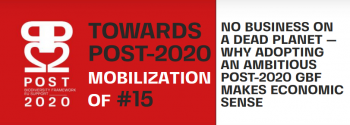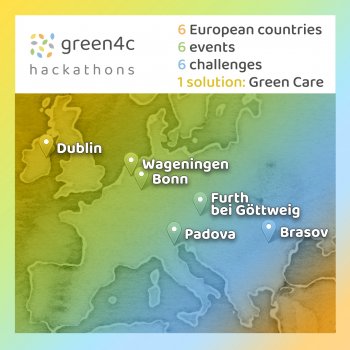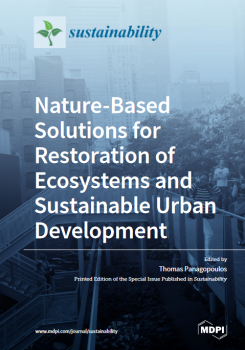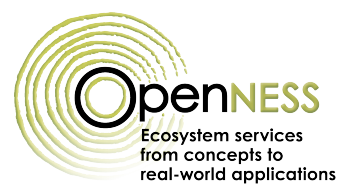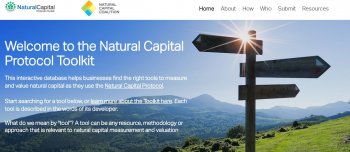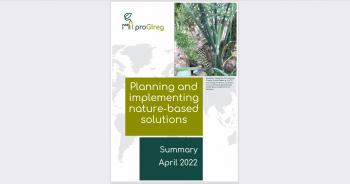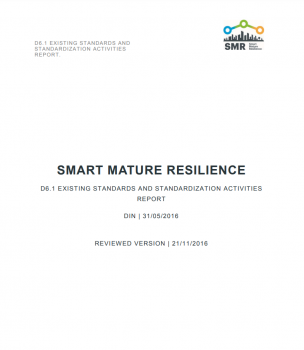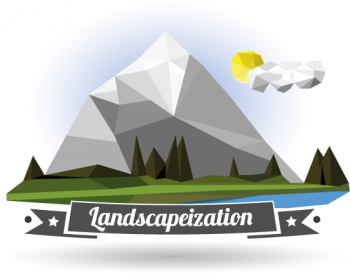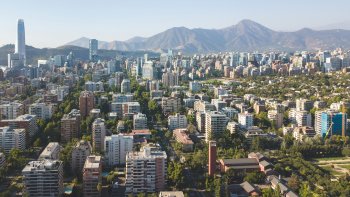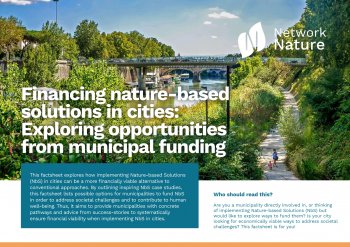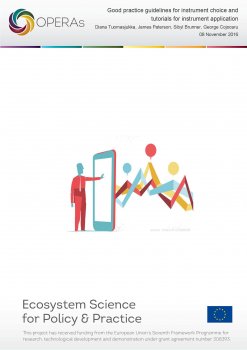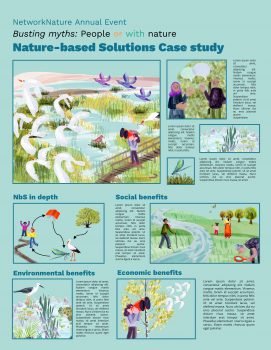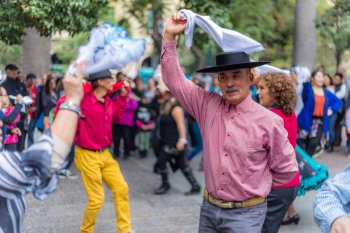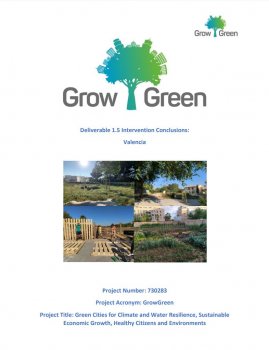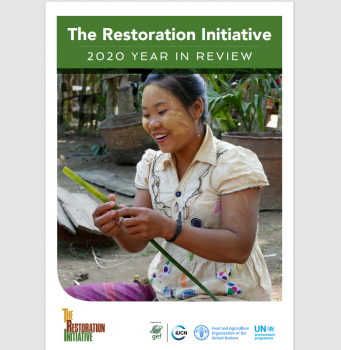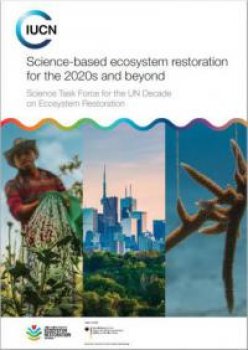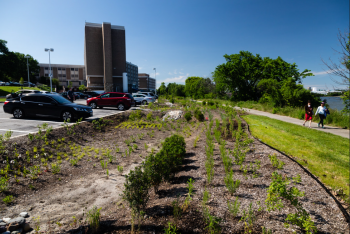Marketplace
No business on a dead planet — why adopting an ambitious post-2020 GBF makes economic sense
Nature is at a tipping point. More than 1 million species are threatened by extinction 1, 75% of world’s land and 66% of the marine environment 2 are significantly altered by humans, and the temperature is expected to rise between 2.6°C and 3.9°C 3. The science is clear—the nature crisis must be
Green4C Hackathons
In a world that is increasingly urbanized and threatened by the climate crisis, people are more stressed and disconnected from nature. According to the EU Biodiversity Strategy 2030, “we need nature in our lives” to improve our psycho-physical health and that of the Planet. Indeed, there is a
Nature-Based Solutions for Restoration of Ecosystems and Sustainable Urban Development
Cities are facing a broad range of social and environmental challenges due to the current pressure of global urbanization. Nature-based solutions aim to utilize green infrastructure to improve people’s health and wellbeing. The design of urban environments must embrace the individual ideals of
OpenNESS Synthesis paper: Public goods
Public goods represent a particularly complex category of environmental resources. The increasing importance of the concept of public goods in national and international legal frameworks, particularly relating to questions surrounding the role of private or public actors in providing and
Natural Capital Protocol Toolkit
The Natural Capital Protocol Toolkit is an interactive database that helps businesses find the right tools to measure and value their impacts and dependencies on natural capital as they use the Natural Capital Protocol. By tools, we mean any resource, methodology or approach that is relevant to
Planning and implementing nature-based solutions - summary
This report is a summary of the proGIreg project's efforts in planning and implementing nature-based solutions, the summary is derived from in-depth reports linked to the end of each chapter. Explore the reports to learn more!
- Document
Use of Bite technology for tree infusion in chestnut groves
Endotherapy offers an efficient alternative for treatments application in chestnut groves
EXISTING STANDARDS AND STANDARDIZATION ACTIVITIES REPORT
The aim of this report is to disseminate knowledge about relevant existing standards and standardization activities amongst project partners and to support the awareness raising of possible missing standards. Thus this document will show the current resilience and Smart City standardization
LANDSCAPEization
The LANDSCAPEization toolkit allows the visualization of and reporting on ecosystem services (ES)- and non-ES-related information in real-time over spatial scales. Embedded in a decision support system, the provided information supports the communication of land use changes and their impacts on ES
- Document
Sharing-profits methodology for community forest arrangement
The PRI.FOR.MAN Project aimed to refine profit-sharing methodology for community forest management, ensuring fair timber profits for each owner.
Interlace Stakeholder Engagement Strategy
Stakeholder engagement is a central element of the INTERLACE project as it aims to co-produce tools, governance instruments and other project deliverables with local stakeholders, as well as facilitate knowledge exchange between local, regional and global stakeholders, to inform and support the
CONEXUS Policy Brief 6 - Moving towards greener cities: Strategies to develop green spaces in vulnerable neighbourhoods
This policy brief explores the pressing need to address the inequitable distribution of green spaces in cities. The core case study will be the experience of a pilot project in Conchalí, Metropolitan Region of Santiago de Chile, which offers insights on strategies to address the challenges to
NetworkNature Factsheet 4 - Financing nature-based solutions in cities: Exploring opportunities from municipal funding
This factsheet explores how implementing Nature-based Solutions (NbS) in cities can be a more financially viable alternative to conventional approaches. By outlining inspiring NbS case studies, this facthseet lists possible options for municpalities to fund NbS in order to address societal
OPERAS D4.5 Good practice guidelines for instrument choice and tutorials for instrument application
About “Guidance on choice and application of instruments” Task 4.5 coordinates the work and information flow across WP4 Instruments and produced an overall synthesis of the operational potential of ES/NC instruments, a road map for their application and practice guidance for choice and use of ES/
Virtual Exhibition of Selected NbS Case Studies | NetworkNature Annual Event 2024
As part of the NetworkNature Annual Event 2024 "Busting Myths: People with Nature," a special poster exhibition was held alongside the panels and presentations. This exhibition showcased 9 Nature-based Solutions case studies from across the globe, offering participants a deeper
State of the art, good practices and NBS typology
This report presents a series of developments, trends and case studies that exemplify the growing importance that Nature-Based Solutions (NBS), as well as other closely related concepts, are having in thinking and practice around reconciling urban planning, human well- being and sustainability,
GrowGreen Report: Intervention Conclusions: Valencia
Within the EU-funded GrowGreen project, this report presents the challenges and results from the work in Valencia, focused on Benicalap, an area located in the north west of the city, chosen for the need for regeneration and investment. The aim of this report is to demonstrate how NbS can help
The Restoration Initiative. 2020 year in review
"The Restoration Initiative: 2020 year in review" presents an overview of progress and stories from the second year implementation of The Restoration Initiative (TRI) programme. With support from the Global Environment Facility, this pathbreaking programme led by IUCN in partnership with
Science-based ecosystem restoration for the 2020s and beyond
The documenti presents recommendations of the Science Task Force (STF) of the UN Decade for Ecosystem Restoration, led by the International Union for Conservation of Nature (IUCN) and comprised of leading subject experts as specific actions to be undertaken by public and private stakeholders to
ZÖLD-KÉK INFRASTRUKTÚRA: Zöldinfrastruktúra-hálózat fejlesztés
A Földművelésügyi Minisztérium megbízásából készült 2 kötetes, részletes összefoglaló a zöldinfrastruktúráról. A szöveg rámutat, hogy a zöldinfrastruktúra fogalma nem egységes, intézményenként, szabályozó szervenként, országonként eltér. Az anyag tematikusan részletezi a vonatkozó nemzetközi és
- ‹ previous
- 23 of 45
- next ›

